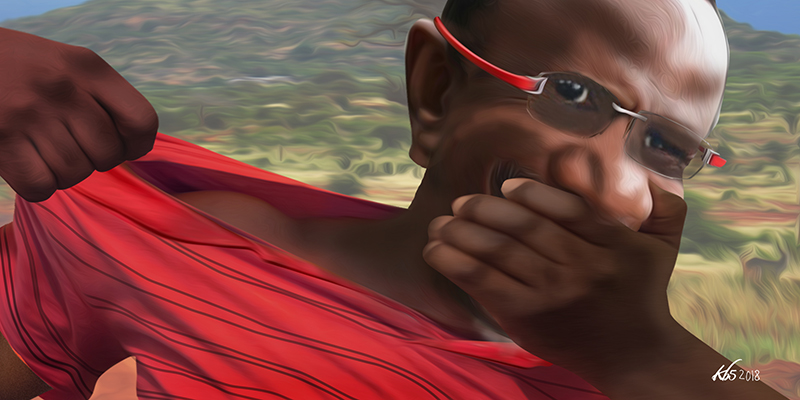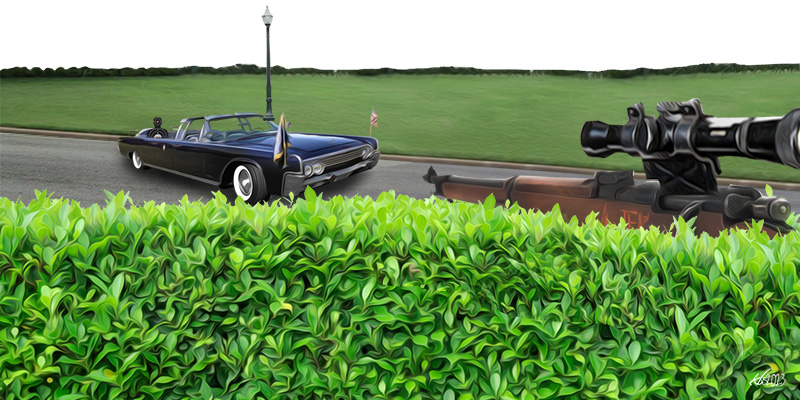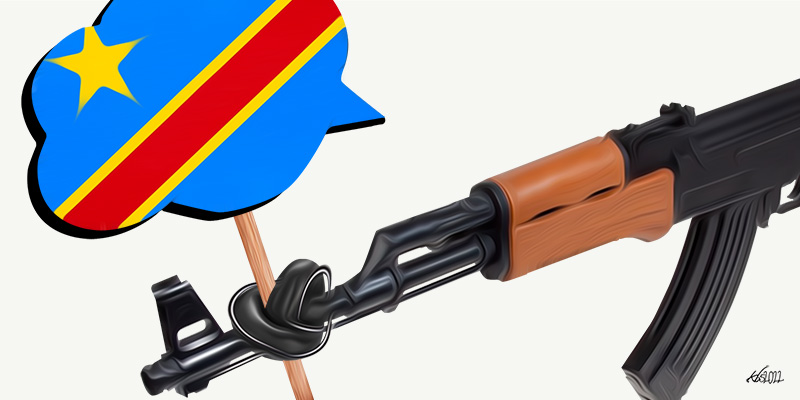The Inspector General (IG) Joseph Boinnet’s recent pronouncement that the police had formed a special squad to deal with the Jubilee government’s critics confirmed what many believe to be a plot by the government to clamp down on opposition politics and what it considers to be individual “dissidents” and provocateurs.
The police’s daring move of snatching opposition National Super Alliance (NASA) MPs and supporters on highways and from their homes at the beginning of this year was preceded by the sensational episode when the secret police stalked and ambushed David Ndii late last year. The kidnapping of Ndii, NASA’s economic and strategic advisor, in a hotel lobby in the south coast of Kenya and his “midnight safari” from Mombasa to Nairobi and then straight to the Directorate of Criminal Investigations (DCI) at Mazingira House off Kiambu Road – the successor to Nyati House’s operations – is a strategy that the government hopes to continue using to harass the opposition as it seeks to legitimise its contested rule.
Ndii’s abduction and his 500km journey in the dead of the night on December 4, 2017, was a precursor to lawyer Miguna Miguna’s dawn kidnapping from his house in the suburbs of Nairobi and his eventual deportation to Canada.
Nyati House is an oblong-shaped, deathly grey, macabre building that has always been the site of eerie and mysterious police activities. It was a torture chamber reserved for Kenyans who differed with President Daniel arap Moi’s despotic rule. Nyayo House, a sister to Nyati House, also in central Nairobi, was the other torture dungeon. The five-floor, two-part symmetrical building, which is currently undergoing renovations, has always been unkempt and ghostly, with exit doors permanently shut with metal grills.
Ndii’s abduction and his 500km journey in the dead of the night on December 4, 2017, was a precursor to lawyer Miguna Miguna’s dawn kidnapping from his house in the suburbs of Nairobi and his eventual deportation to Canada. The suspension of passports of targeted NASA advisors and supporters that the Jubilee government categorises as consultants and politicians, is yet another tactic the Jubilee government is using to possibly scuttle and disorient a recalcitrant opposition.
The kidnapping and transporting of state opponents by the secret police in the dead of the night is a method that was perfected by the former Communist countries of Eastern Europe and apartheid South Africa.
The night journey
It is some minutes past 7.00pm on December 4, 2017, a breezy, cool Sunday. David Ndii is walking towards the lobby of Leopard Beach Hotel in Diani on Kenya’s south coast. Suddenly, he is accosted by two nondescript fellows who enquire from him whether he is David Ndii. It is evident from their inquiry that they are not sure of his identity. All the same, Ndii answers in the affirmative. They ask him to accompany them. His first instinct is to ask them, “Who has sent you?” To which the police officers answer, “DCI director Ndegwa Muhoro.”
The police officers plead with him to be cooperative and to just allow them to lead him to the unmarked waiting vehicles (in their minds, they are probably praying that he should not cause a scene that will interfere with their mission). Ndii hesitates momentarily – he was walking to the hotel reception with his daughter to pick his feature phone popularly known as mulika mwizi (literally translated as thief catcher) in the Kiswahili language. He turns towards the hotel room where his wife is. The officers follow him, but on second thoughts, he decides he should not let the police near his family and into his room. So he tells his daughter to tell her mum that there are some police officers who want to take him away.
See also: NYAYO HOUSE: Unravelling the Architecture and Aesthetics of Torture
Ndii has been at the south coast for three days. He came down from Nairobi to attend his wife’s nephew’s wedding. After the wedding on December 3, 2017, he decides to stay on with his family – after all, it was the holiday season and they could do with some beach holidaying. In hindsight, Ndii’s muses, “I should just have proceeded to the reception area. That way maybe I’d have made it difficult for the police to take me away.” He was charging his mulika mwizi because his smart phone had fallen into the swimming pool. When it rains…it pours. This was the smart phone that had all his contacts so he could not immediately call his friends to tell them what was happening to him.
Sandwiched between two police officers in the back seat of one of the vehicles, Ndii is calm, but his mind is racing with all manner of thoughts about what they are planning to do with him.
The police take him to two new Subaru Outbacks, and together they drive to Diani Police Station, which is a short drive away. While the two policemen are accosting him, five others are lurking under the cover of darkness at the hotel’s parking bay.
The Subaru Outback, just like its predecessor, the Peugeot 504 station wagon, is today the preferred get-away car of secret police covert operations. It is hardy, fast, powerful and a 4-wheel drive. The Peugeot 504 station wagons used in the 1980s and 1990s were all white in colour. Because the secret police used to be recruited from different police stations and regions, white was the identification code that allowed covert police to easily recognise each other. Other than white Peugeot 504 station wagons, the other covert vehicles the secret police used was white Land Rovers.
In Nairobi’s central business district, according to one police source, one out of every four Subaru Outbacks prowling the streets is a police car. They come in different shades, but the secret police prefer metallic grey and silver colours. At the Central Police Station on Harry Thuku Road, next to the University of Nairobi, you will find some parked there. It is here that the police keep on flipping their registration number plates depending on the nature and state of their undercover missions.
At Diani Police Station, the two police officers who had abducted Ndii from the hotel communicate with some “higher authorities” on what is to be their next move. After mobile phone consultations, they get back into the vehicles and head to Mombasa island. On their way to the Likoni Ferry, they pull aside several times to get instructions. They are constantly on their phones, talking to “higher authorities” who do not seem to have made up their minds what they want the police officers, who are seven in number, to do with Ndii.
Agitated and cursing, the police drive back to Diani Police Station and park outside. After they had driven away to Likoni, a crowd had gathered at the station demanding to know where the police had taken Ndii. The crowd was composed of the Leopard Beach Hotel’s subordinate staff. It occurs to Ndii that while at the hotel, the housekeepers, waiters, stewards and other workers had taken note of his stay at the hotel and had come to the station to support him. His wife was also at the station with opposition leader Raila Odinga’s daughter, Winnie. They demand to see Ndii.
Kandie unleashes a smartphone and proceeds to read from Tuko.co.ke, an online news website. Listening to Kandie read fake news purportedly about him and his “illegal activities” against the state, Ndii – who is visibly amused and aghast that he was tracked all the way to the coast on account of fake stories about him – tells Kandie, “There are four ways in which I communicate and engage with the public. I write a newspaper column, I conduct public speaking, I run a Twitter handle and I engage in TV interviews.”
The Officer Commanding the Police Station (OCS) threatens Mwende, Ndii’s wife, Winnie and the crowd, telling them they are “trespassing a police station”. This ridiculous statement shows that he did not expect a crowd to mill around his station so quickly and openly showing solidarity with a now well-known public figure. This whole rigmarole – of to-ing and fro-ing – takes two hours. Then they set off for Nairobi at about 10.00pm. The same ritual – of the vehicles pulling aside to receive conflicting instructions – commences yet again.
Sandwiched between two police officers in the back seat of one of the vehicles, Ndii is calm, but his mind is racing with all manner of thoughts about what they are planning to do with him. One of the thoughts that crosses his mind is: Could they possibly be planning to execute him, just like they had executed radical sheikhs from Mombasa who had been summarily assassinated a while back? He asks to be allowed to take a toilet break. They refuse.
One of the officers is carrying an AK47, which he places under the seat. This time they drive all the way to the ferry’s gangplank. At this time of the night there are few ferries, so they have to wait for one to make its return trip from the other end of the crossing. When they cross the ferry, they head to a Total petrol station in the city centre, where they refuel and check tyre pressure. It dawns on the police officers that they are set for a long journey – which apparently they had not planned or prepared for – because they loudly complain and grumble about it. “Shouldn’t they have forewarned us,” they seem to say.
They had barely passed through the Makupa Causeway when the police inside the vehicle carrying Ndii were already wondering loudly when they would arrive in Nairobi. They estimate that they will arrive in Nairobi around 7 the next morning They abruptly stop somewhere in the bush and tell Ndii that he can now relieve himself. It is pitch dark. They all come out, but Ndii finds this idea of stopping in the middle of nowhere in the dark night spooky and not amusing at all. When they had stopped to refuel at the petrol station he had asked to be allowed to go the toilet and but they had not let him.
Left seated inside the vehicle as the officers oversee the servicing of the vehicles, an eerie thought crosses Ndii’s mind: If only they could allow me to go to the toilet, I could find a way to melt into the street. The city streets of Mombasa are lively at night and there a lots of people milling about. The policeman who was in charge of the AK47 that he had placed under the seat pulls it from there and hands it over to the other policeman guarding Ndii. Instinctively, he asks Ndii: “Do you have a firearm?” “No, I have never owned a gun,” Ndii tells him.
After refuelling, they drive like crazy. Ndii wonders if they are on a suicide mission. “Is this their plan to kill me?” he thinks to himself. “Let me belt up”, he says to one of his captors as they overtake and overlap the multiple 24-wheel trucks plying the busy highway. They are driving like obsessed mad men. They stop at Mariakani to buy snacks for themselves. They ask him whether he wants anything. He declines. It seems that these policemen were plucked from their homes, not having eaten supper, and not fully briefed on the nature of the mission they were supposed to undertake. They were unaware and unprepared for a long journey in the middle of the night.
For the first time since they went for him at the hotel, they engage him in a conversation. “Are you worried?” one of the policemen asks him. “We have no intention of harming you,” he hopes to reassure Ndii. What could they be up to with all this banter? “I don’t know who sent you,” Ndii answers him. The conversation does not go far. They drive dangerously the whole night. When they reach Mombasa Road in Nairobi, they take the northern corridor, which passes the North Airport Road and the Embakasi garrison and that crosses Kangundo Road through Ruai onto Ruiru railway line and then links with the Thika superhighway to connect with the Eastern bypass that starts at the Kiambu-Ruiru Road.
After they had dealt with their agenda of the day, Ruto turned to complaining about Ndii, lamenting how Ndii was feeding NASA luminaries with the political theory of “grabbing power”. His grouse was a regurgitation of the standard Jubilee Party cabal’s conventional thinking on Raila Odinga: “Raila is a ‘good man’, but has been captured by hardliners” – chief among them, one David Ndii.
Caught in the traffic snarl-up, the policemen buy a newspaper from the roving vendors. It is The Standard. On the front page, there is a mugshot of Ndii. They tune into the radio and the news is all about Ndii’s abduction. The police now turn to examine Ndii properly. They obviously did not know who he is. “Who is Ayub Ndii”, one of the policemen asks him. Ayub is actually Ndii’s uncle. In proper Kikuyu parlance, Ayub would be referred to in the English language as “younger father”.
Avoiding the superhighway, the police drive through the back roads behind the sprawling Mathare North slum. They are headed to the Directorate of Criminal Investigations DCI. When they reach there, Ndii is taken straight up the stairs to an office. The first thing he asks is, “Why am I here?” to a junior officer. “Can I have a phone?” The junior officer shrugs off his request – he is possibly as clueless as Ndii about why he has been brought here. “I am here to keep you company,” says the policeman nonchalantly. Another junior cop shows up and joins Ndii in the sparsely furnished office. He offers Ndii tea. Ndii refuses the offer. The two policemen are obviously Akamba because they converse in the Kamba language while keeping Ndii company, pending further instructions. Ndii is kept at the DCI for several hours.
Then the real police honcho shows up. He is the Senior Superintendent of Police (SSP), somebody called arap Kandie. The office that Ndii is being kept in is the Serious Crime Office (SCO). Kandie pompously announces that he is the head of SCO. “Am I under arrest?” Ndii immediately asks him. Kandie mumbles some unintelligible answer. He appears not to know why Ndii has been referred to his office. “We need to interrogate your crime,” he tells Ndii. “The last time I was under this kind of situation, it was 30 years ago, I hope we are not going back there?” Ndii tells Kandie.
“Trouble shooters”
In 1987, Ndii was a third year economics student at the University of Nairobi’s main campus. It was a time when there was a crackdown on university students. President Daniel arap Moi had unleashed his secret police to hound the students, who he deemed were in cahoots with political dissidents opposed to his dictatorial regime.
Ndii spent two weeks at the Nyayo House bunkers, where he was tortured and thoroughly interrogated. That was the same year that Miguna Miguna was arrested by the same secret police, and later forced into exile, first to Tanzania, where he stayed for three months, then further south to Swaziland, and eventually to Toronto, Canada, after a six-month sojourn in the southern African state.
SSP Kandie grouses over the fact that people like Ndii are “trouble shooters” and their only agenda is to cause “chaos and disaffection” among “peace loving Kenyans.” Why is he constantly attacking the government, he wonders aloud – loud enough to solicit a rebuttal from Ndii. He asks Ndii about the Larry Madowo NTV talk show in which he had participated several days ago. “I will not discuss political theory with you,” Ndii replies to Kandie.
Kandie unleashes a smart phone and proceeds to read from Tuko.co.ke, an online news website. Listening to Kandie read fake news purportedly about him and his “illegal activities” against the state, Ndii – who is visibly amused and aghast that he was tracked all the way to the coast on account of fake stories about him – tells Kandie, “There are four ways in which I communicate and engage with the public. I write a newspaper column, I conduct public speaking, I run a Twitter handle and I engage in TV interviews.”
At that point, Kandie asks his four junior officers – two had tagged along him to join the other two – to leave. Among the officers is a Mr. Cheruiyot and a Kamba deputy SSP. Kandie then produces a statement and asks Ndii to sign it, stating that it is for his own “protective custody”. Ndii declines to sign it. Instead, he writes his own statement, now detailing the four ways he engages with the public and how he goes about making his political pronouncements.
As he engages with Kandie over whether to sign the statement, several of Ndii’s friends and political activists are now gathered at the DCI precincts, demanding for his release. Among them are lawyers James Orengo and Edwin Sifuna. Having not eaten for more than 18 hours, Ndii asks his lawyers to bring him coffee from Java Café. At 2.30pm the police say the charge sheet is ready. So, accompanied by Orengo and Sifuna, and not by the police, Ndii is driven to the Milimani High Court.
Cheruiyot is the designated case officer and so accompanies Ndii to court. The Director of Public Prosecutions (DPP) Keriako Tobiko – who has since been appointed the Cabinet Secretary for Environment – is not ready to charge Ndii until the police present his office with what he is being charged with. The lawyers are frantic; if they do not move with haste, the police may find an excuse to lock Ndii in for the night because it is already past 4.00pm and there is no charge preferred against him. They then all head to Pangani Police Station to get a police bond. The case officer asks Ndii how much he wants to pay for his bond. The lawyers give an arbitrary figure of Ksh10,000 and Cheruiyot says KSh10,000 it is. Ndii is escorted by a convoy of ten vehicles and just before 5.00pm he gets his bond. The bond says that he should report to DCI on December 11, 2017.
The derisive characterisation of Raila as a “good man” by Jubilee Party carpetbaggers is a well-oiled narrative, deliberately and systematically propagated by the architects of the theory that forming a coalition government is one way of assuaging Raila’s electoral losses, fully knowing that these losses were politically engineered through electoral malpractices.
Ndii reports to the DCI on December 11 and rewrites his statement. The police in their characteristic prevarication and procrastination claim that they are still not done with their investigations, therefore the DPP cannot commence any prosecution against Ndii. He is again asked to report to DCI on December 28, 2017. No word on his presumed “illegal state activities”, or any clue as to when the police investigations will be complete. He again reports to DCI soon after new year’s day in January. “No instructions still from the DPP”. Days later, the DPP is moved from his job. “This thing has become a circus,” Ndii concludes, and from then henceforth, he will wait to hear from the new DPP on his case.
“A good man”
Ndii realises that the plan to fix him was well-orchestrated, but poorly executed. From the officers who abducted him, to the interrogating officers, it appeared to be a combined Kalenjin-Kikuyu affair, apart from the Kamba rookie officers who were asked to keep him company. The ethnicisation of the harassment of key opposition figures has now been taken to the apolitical police force: the police officers who are now sent to pick up and intimidate opposition figures are carefully selected to convey a deliberate ethnic supremacy of brutal and naked force as a counter-measure to an equally and deliberate ethnicisation of the opposition politics by the government.
A couple of weeks before Ndii was trailed all the way to the south coast and picked from the supposedly safe confines of a five-star beach hotel, a Jubilee Party politician allegedly had a meeting with Deputy President William Samoei Ruto. After they had dealt with their agenda of the day, Ruto turned to complaining about Ndii, lamenting how Ndii was feeding NASA luminaries with the political theory of “grabbing power”. His grouse was a regurgitation of the standard Jubilee Party cabal’s conventional thinking on Raila Odinga: “Raila is a ‘good man’, but has been captured by hardliners” – chief among them, one David Ndii.
The derisive characterisation of Raila as a “good man” by Jubilee Party carpetbaggers is a well-oiled narrative, deliberately and systematically propagated by the architects of the theory that forming a coalition government is one way of assuaging Raila’s electoral losses, fully knowing that these losses were politically engineered through electoral malpractices.
Contrary to what the Jubilee Party elites would like Kenyans to believe, the talk of forming another coalition government has always been the ruling party’s idea. This idea is today being pushed publicly by one Peter Karanja, the Secretary General of the National Christian Council of Kenya (NCCK), the umbrella body that groups together Protestant churches. Karanja’s argument, which is the base logic of Jubilee Party hawks, is that if the post of Prime Minister is created by amending the constitution or otherwise, Raila will calm down, and this will in effect also calm down his supporters and all shall live happily ever after.
The Jubilee Party fraternity’s characterisation of Raila as a “good man” masks their real intentions. After the successful signing of the Peace Accord, which was reached after the post-elective violence (PEV) of December 2007/8 on February 28, 2008, I sat down with an influential Central Kenya politician in an exclusive Nairobi golf club to review the new political arrangement. “Let me tell you, we (Kikuyu political cabal) found the perfect formula for dealing with these Luos. Invite them to join the government by creating for them a pompous office, provide some chase cars and security detail (which you can always withdraw and return at will), as you keep a tight leash on them. Give them some budget to entertain themselves. In the process, they will soon be caught up in the corruption dragnet. This will disarm them, so every time they raise their voice on state scandals, you quietly remind them of the ‘living in a glass house’ aphorism.”
The Jubilee Party barons also cynically refer to Raila as a “good man” because they believe he is “tamable”. When in 2008 he agreed to form a coalition government with Mwai Kibaki, the Kikuyu political elite sighed with great relief, but later boasted among themselves of how they were the masters of political chicanery. “We outsmarted our chief political nemesis. I suspect we are going to rule this country for a very long, long time,” said the bragging politician.
In this era of social media and smartphones, the police can no longer handle “government dissidents” the way they did twenty years ago. Add to this a progressive constitution and you have a government that is groping in the dark and resorting to knee-jerk reactions
So, early on when Ndii was identified as a “hardliner” by the Jubilee Party mandarins, they sought to isolate Raila from him, or if you may, Ndii from Raila – a scheme that does not seem to be working. Alongside, Ndii, they also sought to profile lawyer Norman Magaya, another NASA advisor and presumed “hardliner”. Convinced that the much-taunted swearing-in of Raila Odinga was going to take place on December 12, 2017, on Jamhuri (Independence) Day, the Jubilee Party elites began toying with the idea of scuttling the move by taming Ndii days before the event took place. That is why, when the police bonded him on December 5, 2017, they asked him to report to DCI on December 11, the eve of the swearing-in ceremony, in the belief that they would be disorganising and handicapping the arrangement.
The crux of the matter is that for the first time the government is having to play catch-up with an increasingly cheeky and unpredictable opposition. The speed and turn of political events have ensured that the government cannot second-guess what the opposition is really up to. Yes, the Jubilee Party “won” the election on October 26, 2017, but four months later, the government, even after having announced the cabinet, does not seem to have found its gravitas. Its best laid plans seem not to have taken root and those plans seem to be getting continuously disrupted.
In this era of social media and smartphones, the police can no longer handle “government dissidents” the way they did twenty years ago. Add to this a progressive constitution and you have a government that is groping in the dark and resorting to knee-jerk reactions, not really knowing what to do. It is patently clear, the “arrest” of Ndii and the deportation of Miguna Miguna were not well-thought out moves. The first priority of totalitarian regimes all over the world is complete control of the flow of information – when they realise this is a futile exercise, they resort to intimidation and underhand tactics.
Fred Matiang’i, the Cabinet Secretary for Internal Security, sounded ridiculous when he sought to explain to a section of the media that the government had not ordered a media shutdown, and why some TV stations had been closed. He said that the government had exposed a scheme by the opposition to cause a bloodbath in the guise of swearing-in Raila Odinga, “The People’s President”, at Uhuru Park. The well-attended ceremony – better attended than President Uhuru’s swearing at Moi International Sports Centre on November 28, 2017 – comprised a great multitude of people from all walks of life. Hence, the switching off of the NTV and KTN TV stations’ signals for ten days and Citizen TV for even longer, was an attempt at foreclosure by the government, a move that was reminiscent of the dark days of President Moi’s tyrannical rule.
Ndii’s “midnight safari” is, therefore, a metaphor for a dark state and a regime that is desperately looking for legitimacy.








